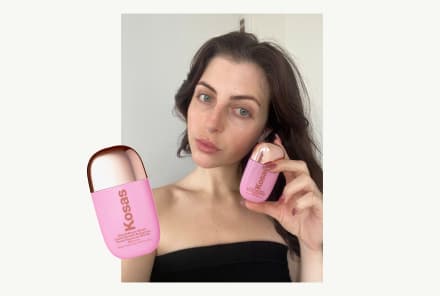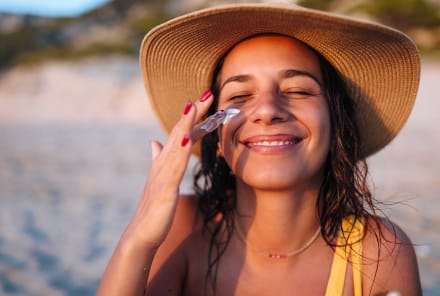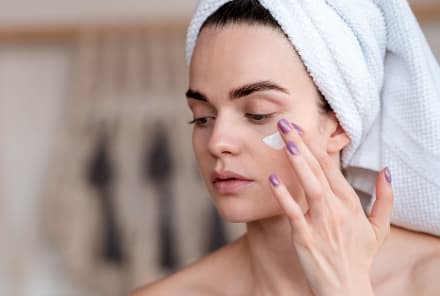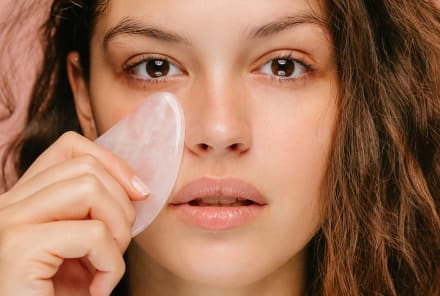Advertisement
Antiperspirant vs. Deodorant: Benefits, Risks & How To Choose



A tale as old as time: Someone is in the market for an underarm product and decides to explore new options. Maybe this involves a Google search about the best products out there. Maybe this means asking around to see what their friends are using, be it natural or traditional.
Finally they end up at their local drugstore or on their favorite beauty website only to see a bunch of claims and phrases like "antiperspirant," "aluminum-free," "deodorant," "baking soda-free," "safe," "clinically tested," "essential-oil free," "all-natural," and "clean"—not to mention a laundry list of ingredients, and they may not fully understand whether they are "good" or "bad."
This confusion is totally fair but not to be feared. With a little guidance—and a healthy dose of nuance—you can totally navigate the wild and vast world of underarm products.
Antiperspirant vs. deodorant: What is the difference?
While the underarm conversation can get complicated and messy, this distinction is actually very simple. An antiperspirant is an underarm product that contains aluminum and is able to block sweating.
A deodorant does not stop sweating but will help mask, curb, or inhibit odor via other ingredients, like baking soda, acids, clays, starches, perfumes, and so on.
Simple enough right? OK, here's a denser breakdown.
Antiperspirant
As we noted, antiperspirant contains aluminum and is able to help limit your perspirant output. I'm sure you can see how it got its name: "anti" and "perspirant." See, sweat causes body odor thanks to the specific types of bacteria that live under your arms.
We all have skin microbiomes (or the collection of microorganisms that live on our skin), and the armpits have a very specific micro-niche. The bacteria present here feed on sweat and then release an odor that we identify as B.O. (Well, specifically an enzyme present in a very specific strain of bacteria called the Staphylococcus hominis creates the scent, but let's not get too into the science weeds.)
This is where antiperspirants come into play: It stops said odor-causing sweat with the use of aluminum, which plugs your sweat glands for about 12 to 24 hours before they naturally come out of your pores and the product needs to be reapplied.
However, if you make your way to the drugstore, you'll likely see many of these antiperspirants marketed as deodorants as well. That's because they likely also have deodorizing qualities (a la perfumes). Not to mention, deodorant is the much more common name for this class of product, and thus they use it for marketing purposes, even if antiperspirant is the more appropriate name.
Additionally, people get confused because just because a brand is natural-leaning or marketed doesn't mean they don't also create antiperspirants. Certainly, there are options out there that may appear of the more "green" variety but still use aluminum—albeit, perhaps it's sustainably sourced aluminum.
How will you know if your options are actually antiperspirants and contain aluminum? Easy: Flip it over to the back, and it will have a drug panel. Antiperspirants are one of the few topicals regulated as a drug by the FDA, and thus they need to be packaged accordingly.
Deodorant
Deodorants, you guessed it, "de" "odorize." (The naming here is so simple, no?) These are, by definition, aluminum-free and will not stop you from sweating but only deal with the odor side effects of that sweating. And while not a hard-and-fast rule, deodorants tend to be of the clean and natural variety.
Now, the deodorant category isn't as uniform as antiperspirants. Deodorant, being an unregulated term, can use a wide variety of actives to get the job done! You'll see things like clays, baking soda, acids, starches, minerals, essential oils, and even peptides—and each of these uses a slightly different mechanism to control odor.
Let me explain a few:
- Clays—like bentonite and kaolin—are highly absorbent minerals that can absorb both moisture and odor.
- Baking soda is naturally very alkaline, which then adjusts the pH of the area, making it less hospitable for the bacteria.
- Alpha-hydroxy acids also adjust the pH, just in the opposite direction; additionally, they help brighten the area, as dark armpits are a common concern for many.
- Starches and powders, like arrowroot or rice starch, are more sensitive-skin-safe ways to absorb moisture.
- Botanical extracts, like garcinia mangostana peel extract and magnolia bark extract, both have strong antimicrobial and antioxidant properties, which can be beneficial at balancing the microbiome in favor of good bacteria.
- Finally, essential oils can provide a nice smell to help mask any odor that does form. Modern deodorants use a combination of several of these actives to amp up the efficacy.
Now, there are natural ingredients that may have some antiperspirant qualities. For example, peptides may decrease stimulation of the muscle, as they are shown to do in clinicals in the face (and thus, less wrinkle formation1). Theoretically if used as in a deodorant, this may lessen sweating (this is why people get Botox in the armpit; it's a similar mechanism), but this is far from proven. And at the moment, these are not approved by the FDA and thus can't claim the "antiperspirant" label, even if they ultimately may help your body control perspiration. In the end, these ingredients need to be more widely studied before we get to that point—and we look forward to it!
Are antiperspirants bad to use?
Given how prevalent this conversation is in wellness, beauty, and the general population, you've likely heard that antiperspirants are best to avoid. This is something that has been battled out in the media and scientific journals for some time now. Here's what we know given the research available to us today.
Are they carcinogenic or bad for overall health?
The most common argument against aluminum that you hear has to do with the potential link to breast cancer. There's reason for pause here, but the science itself isn't necessarily clear at the moment, although many studies have been done to get to the bottom of it (we're left with nothing but conflicting information).
But the argument goes as follows: Aluminum has been shown to damage DNA and inhibit its repair2, which is why people started questioning its use in the products to begin with. But the question then became, is it at a level that contributes to adverse health effects? The most recent research offers little clarity, unfortunately.
A study published by the National Center for Biotechnology Information showed that women who used both antiperspirants and deodorants were at higher risk for breast cancer3 and had higher aluminum concentrations in their breasts. A big however: The study also found that women with breast cancer had higher levels of aluminum in their breasts than those without breast cancer, and this was irrespective of antiperspirant use. This suggests that breast cancer may be linked to aluminum, but antiperspirant may not be the relevant or only means of exposure.
Now, the other health concern to be made is with those with significant kidney problems. According to the National Kidney Foundation, patients who have stage 4 or 5 kidney disease (or their kidneys are working at 30% capacity or less) should avoid aluminum, as they are not able to filter out the aluminum at a fast enough rate. This was discovered several years ago when researchers found that patients with this advanced stage of kidney issues were developing dementia due to the accumulation of aluminum in their bodies. This is why the drug panel on antiperspirants includes a warning to avoid use if you have kidney concerns.
While more research is needed, we encourage you to be smart and cautious with your choices until definitive conclusions can be made.
Do they contain other unsafe ingredients?
Additionally, traditional antiperspirants usually contain several ingredients we do not recommend, such as endocrine-disrupting preservatives and sensitizing petrochemicals.
Endocrine disrupters are things that disrupt your hormones4, according to cosmetic chemist Krupa Koestline. They do so in a few ways: The first way is that they may simply increase or decrease the levels of a hormone5 you have naturally. The second is that they mimic your own hormones, thereby leaching onto your hormone receptors so your actual hormones have no place to go. The third is they mask your hormones, essentially blocking them from reaching the receptors or doing their unique job in the body. Parabens, for example, mimic estrogen in the body.
"The worst part is that you can't really link any of these to a direct outcome. Because hormones do so much and play such a big part in how your body functions, disrupting these hormones could mean the outcome is literally anything," she says. "It's hard to prove with definitive science that this ingredient causes that [problem]. We don't really know that—it might happen, but we can't prove it."
As for sensitizing ingredients—such as petrochemicals—these can cause damage to the skin, leading to inflammation. However, many natural ingredients—essential oils, baking soda, and the like—can also cause irritation, so this isn't just an issue with traditional products.
How do they affect the microbiome?
Here's an area of concern many don't bring up that we believe should give you pause: how antiperspirants and aluminum affect your skin microbiome.
Your skin microbiome is a very important part of your overall health and your skin barrier function. It's the collection of trillions of bacteria, flora, and fungi that call your skin home. Your body is covered with echo niches that vary depending on the strains that live there (and are influenced by things like oil, moisture, hair, you name it), and your armpits probably have one of the most notable ones.
Overall, your skin microbiome has several very important functions (I encourage you to check out our full explainer here). First and foremost, it aids your immune function: In 2013, scientists did a deep dive6 into the dermis looking for microbes, which were found all the way to the subcutaneous fat layer where it communicates with your internal immune system. It protects us from external infection, too.
From what we can tell, a healthy skin microbiome protects against infection in much the same way a good gut microbiome does: by crowding out overgrowth of pathogenic organisms. Additionally, the microbiome also aids in wound healing, limits exposure to allergens, minimizes oxidative damage, tempers inflammation, and keeps the skin plump and moist. That's a lot of hard work these organisms do for your health.
And research is finding the use of antiperspirants is having an effect on the biodiversity of your microbiome7. And not just the echo niche located in your armpit that's potentially being disrupted: Your entire body might be affected. "Using antiperspirant completely rearranges the microbial ecosystem of your skin—what's living on us and in what amounts," Julie Horvath, Ph.D., head of the genomics and microbiology research laboratory at the NC Museum of Natural Sciences, said in a statement following the study's release. "And we have no idea what effect, if any, that has on our skin and on our health. Is it beneficial? Is it detrimental? We really don't know at this point."
As the study author noted, we have no idea what these changes mean. As the science on the microbiome emerges, it's an important area to keep an eye on.
How should you choose which to use?
There are several things to consider when selecting your deodorant or antiperspirant, and each of them is unique to you. And while we typically fall firmly in the camp of aluminum-free, clean deodorant is the better choice, we also understand that most people don't fully follow a natural routine, even if they are more wellness-minded.
I'll be the first to admit it: I have a stick of traditional antiperspirant in my medicine cabinet for the rare occasion on which I know I'll really, really need it. (You know, hottest day of the year and I have a big event-type situation.)
So with that in mind, I just like to say you're in the no-judgment zone here. Your product of choice is always up to you—we just want you to be informed!
Here's what to keep in mind:
Hygiene
Everyone has different bodies and needs, hygiene included. Some people find they produce more body odor and sweat than others and therefore stick to aluminum-based options—or even get prescription-grade! Some people find that they simply don't have this issue. (For what it's worth, this isn't in your head; research shows that some people are genetically predisposed to produce body odor8, while others aren't.)
And if the only way you feel comfortable is using an antiperspirant, there are valid reasons to do this: Studies show that body odor can affect how you feel about yourself9, long-term self-esteem, and even affects the choices you make in your daily life.
Ingredient preference
While this isn't true across the board, antiperspirants tend to use more traditional and synthetic options, while deodorants use more natural and clean ingredients. We default to natural, clean, and safe synthetic options here—as we believe them to be the better formulations for you and the planet around you—but we understand that not everyone uses clean products across the board.
Skin microbiome
Given that we've come to learn just how important the skin microbiome is in our overall health, it's important that you take it into consideration with everything that you put on your body. Everything you use topically affects your biodiversity—either positively or negatively. And since we know just how dramatically antiperspirants may be affecting your biome, it's important to proceed with caution until we know more. Unfortunately, the research on the skin flora is in its infancy, so that may be a while.
Health considerations
As we went over—at length—there's still so much we don't know about antiperspirant's overall effect on health, including cancer, kidney problems, and so on. Additionally, endocrine disrupters may have adverse health effects in ways we don't fully understand. We believe that it's important to take these unknowns into consideration until we have a scientific consensus.
Skin sensitivities
Deodorant is applied onto a very, very delicate area of the skin. "The skin in the axilla is very thin and will notice and react to a larger array of ingredients than other parts of the body," says Nava Greenfield, M.D., of Schweiger Dermatology Group in NYC. And so you should be hyper-aware of the ingredients you're applying.
This, however, is equally problematic for both categories. Some people have major reactions to petrochemical ingredients, while others can't tolerate essential oils and baking soda. The most important thing is to know what your particular irritations are and avoid them. This is especially true if you are prone to hyperpigmentation in the area, as using ingredients you're sensitive to can case it to get worse.
How long will it take to adjust to deodorant after switching?
So you've made it here, through this very robust deep dive, and have decided to make the switch to aluminum-free deodorants. (Take a look at our favorites for a good place to start.) What should you expect? Like most things, it's not the same across the board. Some people will have an adjustment period (sometimes called the "armpit detox") while others will fare just fine.
But as you transition, here's what's actually going on in the skin. So your body "purges" antiperspirant ingredients from the pores within 24 hours. And it does so naturally and totally on its own (your body's pretty cool, no?). However, some people feel that for several weeks or months after their switch, they have increased sweat and odor. This is an anecdotal phenomenon that actually is traced back to your pores, microbiome, and leveling out sweat output.
Because of this, people often look for ways to deal with the, uh, unpleasant weeks. Armpit masks are common solutions. Now, while your body purges itself of aluminum—and doesn't need your help—masks can help clean the area. "Many people use clay products to absorb the moisture and odor," says Rachel Nazarian, M.D., of Schweiger Dermatology Group in NYC. If you decide to give this a try, you can DIY one right at home.
As for how long it takes you to get used to using deodorant? Ultimately, your body will adjust to your new product in time and on its own schedule. This is unsurprising: Every new skin care product you introduce will take time to get used to, and your pits are no different. We wish we could give you a better timeline, but ultimately we don't want to offer up false hope or misinformation.
"As you move further away from the use of antiperspirants, during the 'switch,' your body slowly regains the ability to activate sweat glands. Essentially, nothing drastic happens when you stop using conventional antiperspirants; it just takes time for your sweat glands to learn to sweat fully again," says Nazarian.
Conclusion
How you take care of your body and body odor is up to you. We, of course, have opinions on the best choices, but ultimately our main mission is to provide you with all the information we have available and let you make your own decisions from there.
9 Sources
- https://pubmed.ncbi.nlm.nih.gov/23417317/
- https://www.sciencedirect.com/science/article/abs/pii/S0378427405002407
- https://www.ncbi.nlm.nih.gov/pmc/articles/PMC5514401/
- https://www.ncbi.nlm.nih.gov/pmc/articles/PMC6468742/
- https://www.ncbi.nlm.nih.gov/pmc/articles/PMC6468742/%20and%20https://jme.bioscientifica.com/view/journals/jme/43/1/1.xml%20Show%20less%20%20Turn%20on%20screen%20reader%20support%20%20Molecular%20mechanism(s)%20of%20endocrine-disrupting%20chemicals%20and%20their%20potent%20oestrogenicity%20in%20diverse%20cells%20and%20tissues%20that%20express%20oestrogen%20receptors
- https://www.ncbi.nlm.nih.gov/pmc/articles/PMC3655727/
- https://www.ncbi.nlm.nih.gov/pmc/articles/PMC4741080/
- https://www.nih.gov/news-events/nih-research-matters/genes-help-govern-your-perception-body-odor
- https://www.ncbi.nlm.nih.gov/pmc/articles/PMC4834355/
Watch Next
Enjoy some of our favorite clips from classes
Enjoy some of our favorite clips from classes
What Is Meditation?
Mindfulness/Spirituality | Light Watkins
Box Breathing
Mindfulness/Spirituality | Gwen Dittmar
What Breathwork Can Address
Mindfulness/Spirituality | Gwen Dittmar
The 8 Limbs of Yoga - What is Asana?
Yoga | Caley Alyssa
Two Standing Postures to Open Up Tight Hips
Yoga | Caley Alyssa
How Plants Can Optimize Athletic Performance
Nutrition | Rich Roll
What to Eat Before a Workout
Nutrition | Rich Roll
How Ayurveda Helps Us Navigate Modern Life
Nutrition | Sahara Rose
Messages About Love & Relationships
Love & Relationships | Esther Perel
Love Languages
Love & Relationships | Esther Perel

















